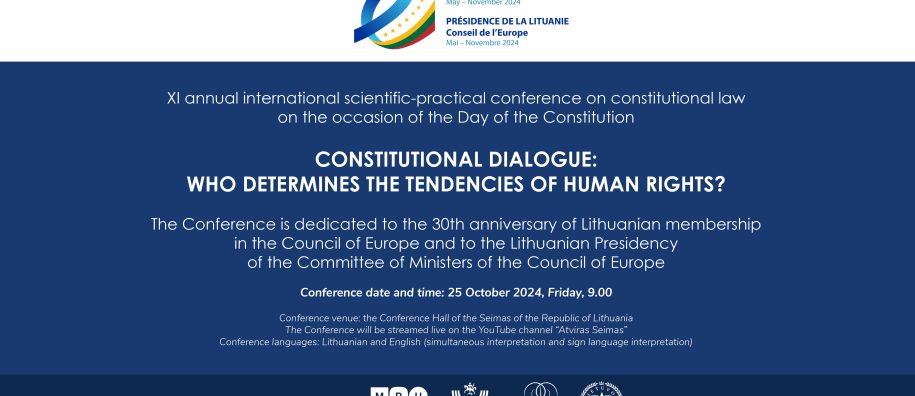
Let’s celebrate the Day of the Constitution together!
On the occasion of the Day of the Constitution, the traditional annual international scientific-practical conference on constitutional law “Constitutional dialogue: who determines the tendencies of human rights?” – will be held in the Conference Hall of the Seimas of the Republic of Lithuania on 25 October 2024 from 9 a.m. The Conference is dedicated to the 30th anniversary of Lithuanian membership in the Council of Europe and to the Lithuanian Presidency of the Committee of Ministers of the Council of Europe.
Respect for human rights and freedoms is an integral part of a democratic state governed by the rule of law. The second half of the 20th century, when the Council of Europe was established and the Convention for the Protection of Human Rights and Fundamental Freedoms was adopted, as well as subsequently other documents, marked the revival of human rights not only in Europe, but also worldwide.
In the Constitution of the Republic of Lithuania, the innate nature of human rights and freedoms is considered to be an eternal value, which cannot be denied under any circumstances. However, in order for human rights and freedoms to be effectively exercised, it is not enough to declare them or to enshrine them in legal acts; it is necessary to take appropriate measures to implement them.
While the last decade has brought significant social and technological changes, it has also become a time when democratic states need to constantly strengthen their commitment to the protection of human rights. The various crises facing the world are posing serious challenges to the ensuring of human rights and freedoms. One of the most disturbing tendencies is the strengthening of authoritarianism and radical ideas. Restrictions on freedom of expression and on freedoms of the press and speech, interference with the activities of the opposition, as well as the narrowing of the possibilities for citizens to participate in public life, are posing a serious threat to democratic values. Therefore, it is important to see universal human rights as universally binding, to rely on international human rights standards as the minimum that the states have committed to ensure, and to strengthen democratic institutions so that they can resist the said threat.
A modern Constitution and an effective Constitutional Court do not yet guarantee that human rights and freedoms will not be violated. Due to a lack of political will, some judgments of the European Court of Human Rights have still not been implemented in Lithuania. Lithuania is still slower than other countries in adopting legal acts to ensure the rights of the groups that constitute a minority in society and are often stigmatised. Not enough has yet been achieved to prevent violence against women, by reducing social exclusion and by strengthening the inclusion of the most vulnerable groups in society. Pandering on the part of politicians to stereotypes existing in society should not lead to restrictions on human rights or even the denial of them.
Thus, this year, the traditional annual conference on constitutional law is intended not only to appreciate the successful cooperation with the Council of Europe, whose member Lithuania has been almost since the restoration of Independence, not only to assess how much Lithuania has achieved in upholding Western human rights values, but also to draw attention to relevant human rights issues of concern to society.
During the Conference, representatives of the academic community, former and current Presidents and justices of the Constitutional Court of the Republic of Lithuania, the Vice-President of the European Court of Human Rights, as well as Lithuanian, Latvian and Ukrainian judges of this court, will deliver presentations and take part in discussions. The Conference is organised by Mykolas Romeris University together with its long-standing partners – the Committee on Legal Affairs of the Seimas of the Republic of Lithuania, the Constitutional Court of the Republic of Lithuania and the Lithuanian Bar Association, as well as in cooperation with the Ministry of Foreign Affairs of the Republic of Lithuania.
Conference will be followed by the screening of documentary film ”Final version” in the historical hall of the Seimas.
Programme of the conference here.
Registration for the Conference here.
Registration for the Conference is open until 20 October 2024.